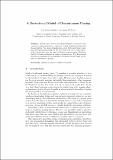Files in this item
A derivational model of discontinuous parsing
Item metadata
| dc.contributor.author | Nederhof, Mark-Jan | |
| dc.contributor.author | Yli-Jyrä, Anssi | |
| dc.date.accessioned | 2021-08-09T23:41:28Z | |
| dc.date.available | 2021-08-09T23:41:28Z | |
| dc.date.issued | 2020-08-10 | |
| dc.identifier | 269843714 | |
| dc.identifier | 4e55f91d-c99c-42a7-a56e-08eb597a7036 | |
| dc.identifier | 85089148687 | |
| dc.identifier | 000672676900003 | |
| dc.identifier.citation | Nederhof , M-J & Yli-Jyrä , A 2020 , ' A derivational model of discontinuous parsing ' , Information and Computation , vol. In press , 104619 . https://doi.org/10.1016/j.ic.2020.104619 | en |
| dc.identifier.issn | 0890-5401 | |
| dc.identifier.other | RIS: urn:920DF2C16B2C438F3AED7AC9E2EB0DB7 | |
| dc.identifier.other | ORCID: /0000-0002-1845-6829/work/79564674 | |
| dc.identifier.uri | https://hdl.handle.net/10023/23747 | |
| dc.description.abstract | The notion of latent-variable probabilistic context-free derivation of syntactic structures is enhanced to allow heads and unrestricted discontinuities. The chosen formalization covers both constituency parsing and dependency parsing. By the new framework, one obtains a probability distribution over the space of all discontinuous parses. This lends itself to intrinsic evaluation in terms of cross-entropy. The derivational model is accompanied by an equivalent automaton model, which can be used for deterministic parsing. | |
| dc.format.extent | 390063 | |
| dc.language.iso | eng | |
| dc.relation.ispartof | Information and Computation | en |
| dc.subject | Parsing | en |
| dc.subject | Grammars | en |
| dc.subject | Weighted automata | en |
| dc.subject | QA75 Electronic computers. Computer science | en |
| dc.subject | T-NDAS | en |
| dc.subject.lcc | QA75 | en |
| dc.title | A derivational model of discontinuous parsing | en |
| dc.type | Journal article | en |
| dc.contributor.institution | University of St Andrews. School of Computer Science | en |
| dc.identifier.doi | https://doi.org/10.1016/j.ic.2020.104619 | |
| dc.description.status | Peer reviewed | en |
| dc.date.embargoedUntil | 2021-08-10 |
This item appears in the following Collection(s)
Items in the St Andrews Research Repository are protected by copyright, with all rights reserved, unless otherwise indicated.

